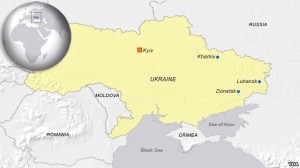BBG Watch Commentary

Voice of America (VOA) senior executives could learn a lot from the most recent article by Prof. Paul Goble, a top U.S. expert on disinformation and propaganda, describing “proclivity of Western journalists to equate balance with objectivity” in news reports about President Putin and Russian actions in Ukraine.
In his article, “Window on Eurasia: Putin Cleverly Exploits Three Weaknesses of the West,” Paul Goble, Sept. 21, 2014, Prof. Goble does not specifically focus on the Voice of America, where he once worked as an advisor to the VOA director. But he makes excellent general observations on how Western journalists fail in their job of reporting on Russia and Ukraine.
Some journalists who are not experts on Russia, do not read and speak Russian, and are not well versed in history, often fall for disinformation emanating from the Kremlin and its media outlets and fail to challenge lies, distortions and misleading statements.
This has been happening at the Voice of America, particularly through VOA’s English language news reporting. Some VOA English news reports from Ukraine and Russia not only lacked objectivity, they sometimes lacked even balance. One Voice of America English news report from eastern Ukraine quoted “pro-Russian activists,” “protesters,” and “guests” referring to “the new fascist government in Kyiv.” While such statements should be reported, ethnic Ukrainians or Ukrainian officials were not quoted in the same VOA report to provide balance and objectivity and there was no attempt to warn that such statements may be part of the Russian propaganda narrative.
Expressions such as “fascists,” “brute force,” “thugs” were used in other VOA reports to describe the Ukrainian government or the Ukrainian military, also without any counterbalance from Ukrainian officials, ordinary ethnic Ukrainians or the Crimean Tatars in the same report.
One VOA report said that “the survey of Crimeans after the Russian takeover showed they are overwhelmingly happy to be part of Russia, with nearly three-quarters of those surveyed saying their life will improve as part of Russia rather than Ukraine.” Some VOA reports referring to historical ties between Crimea and Russia also failed to mention the Crimean Tatars.
The specific VOA report on the public opinion survey failed to mention the Crimean Tatars or the fact that polling was conducted in recently Russia-occupied Crimea behind the back of the Ukrainian government and in an atmosphere of fear and intimidation.
The faulty poll was in fact ordered by the International Broadcasting Bureau (IBB), the management part of the Broadcasting Board of Governors (BBG), the federal agency in charge of VOA. It was therefore ordered by the U.S. government in annexed and occupied Crimea, but most likely without the knowledge and approval of the State Department and certainly without the knowledge and approval of the Ukrainian government in Kyiv.
VOA had also posted online a map showing Crimea to be part of Russia without any indication that the annexation is not recognized by the United States and most other countries. Prof. Goble criticized such mistakes in another article.
These mistakes and lack of objectivity and balance are then multiplied when VOA foreign language services use these reports in translation. Fortunately, VOA Ukrainian and Russian services do not always use them, but other services do. And on some occasions, VOA Russian Service did use VOA English news service reports that lacked balance and objectivity. The Russian service, however, also interviewed Prof. Goble on the subject of Western media’s difficulties in recognizing and exposing Putin’s disinformation.
In his most recent article, Prof. Goble points out that balance in news reporting is not the same as objectivity, but some VOA news reports lacked both. The problems described by Prof. Goble are much less prevalent in news reports from BBC, Deutsche Welle (DW) or Radio Free Europe / Radio Liberty (RFE/RL).
PROF. PAUL GOBLE: “First, as has been true since the start of Moscow’s aggression against Ukraine, Putin has exploited the increasing proclivity of Western journalists to equate balance with objectivity. He and his minions have flooded the media with statements that are simply not true, but many Western outlets report them as part of the story, without identifying them as false or even questioning their veracity.
That allows such journalists to claim objectivity, but it creates a situation in which there is little or no pressure on Western governments to do the right thing. Many journalists (and governments) will not describe what Moscow is doing as an invasion because Putin says there are no Russian troops in Ukraine, despite massive evidence to the contrary.
As a result, in all too many cases, Putin’s lies have defined the situation rather than facts on the ground, and the Western media’s focus on balance – on presenting all sides of the case even if one or more is untrue – gives thuggish leaders like him an opening that they should not have but will not exploit.
It is of course true that the Western media is more ready to do this with Moscow than it is with any other governments, but a simple test is all that is required to see how bad reporting has been: If any other regime were doing what Putin’s is doing, would Western media outlets be describing it in the same way?,” Prof. Goble asks.
